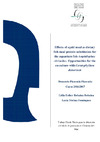Please use this identifier to cite or link to this item:
https://accedacris.ulpgc.es/jspui/handle/10553/56278
| DC Field | Value | Language |
|---|---|---|
| dc.contributor.advisor | Robaina Robaina, Lidia Esther | - |
| dc.contributor.advisor | Molina Dominguez, Lucia | - |
| dc.contributor.author | Plasencia Plasencia, Demetrio | - |
| dc.date.accessioned | 2019-07-30T14:02:22Z | - |
| dc.date.available | 2019-07-30T14:02:22Z | - |
| dc.date.issued | 2017 | en_US |
| dc.identifier.uri | https://accedacris.ulpgc.es/handle/10553/56278 | - |
| dc.description.abstract | There exist no information regarded specific diets for the Midas species, although is an important species in acuariophilia. The main objective of the present trial was to test four diets for the Amphilophus citrinellus (Midas cichlid) , formulated with increased percentages of squid meal instead of the fish meal protein (Control 100/0; D1 75/25; D2 50/50; D3 25/75). The aquaponics consists of a sustainable recirculated system for the coproduction of plants and fish. It is an emerging food production system in Europe, and also becoming the interest in aquarium fish production in the world. In the present experiment the co-culture of the Midas cichlid and the aquatic plant Ceratophyllum demersum (coontail) was studied. The coontail co-culture was stablished to moreover determine the plant benefits on the culture system and the growth and opportunities for produce both species at same time. After 60 days of the experiment, only statistical differences between the different diets were observed in fish length, being the diets with the highest percentage of squid meal those which presented the highest values. Besides, the biochemical results revealed that in the diets with higher percentage of squid meal, the fish presented a higher percentage of lipids, whereas in those that predominated the fish meal was higher the percentage of proteins. Regarding the plants, it showed a rapid growth rate, reaching a 310.4% increase in their weight after 60 days while reducing the nitrates of the system by 50% in a single week. Results showed that for Midas cichlid, Diet 3 (75% squid meal/ 25% fish meal) presented higher fish length even compared to those fish fed with 100% fish meal protein, in turn, the plants effectively reduced nitrate water resulting in a thriving environment for fish growth. | en_US |
| dc.language | eng | en_US |
| dc.subject | 251092 Acuicultura marina | en_US |
| dc.subject.other | Midas cichlid | en_US |
| dc.subject.other | Coontail | en_US |
| dc.subject.other | Co-culture | en_US |
| dc.subject.other | Aquaponics | en_US |
| dc.title | Effects of squid meal as dietary fish meal protein substitution for the aquarium fish "Amphilophus citrinellus" : opportunities for the co-culture with "Ceratophyllum demersum" | en_US |
| dc.type | info:eu-repo/semantics/bachelorThesis | en_US |
| dc.type | BachelorThesis | en_US |
| dc.contributor.departamento | Departamento de Biología | en_US |
| dc.contributor.facultad | Facultad de Ciencias del Mar | en_US |
| dc.investigacion | Ciencias | en_US |
| dc.type2 | Trabajo final de grado | en_US |
| dc.utils.revision | Sí | en_US |
| dc.identifier.matricula | TFT-37755 | es |
| dc.identifier.ulpgc | Sí | en_US |
| dc.contributor.buulpgc | BU-BAS | en_US |
| dc.contributor.titulacion | Grado en Ciencias del Mar | es |
| item.fulltext | Con texto completo | - |
| item.grantfulltext | open | - |
| crisitem.advisor.dept | GIR Grupo de Investigación en Acuicultura | - |
| crisitem.advisor.dept | IU de Investigación en Acuicultura Sostenible y Ecosistemas Marinos (IU-Ecoaqua) | - |
| crisitem.advisor.dept | Departamento de Biología | - |
| Appears in Collections: | Trabajo final de grado | |
Page view(s) 10
82
checked on Jan 10, 2026
Download(s)
180
checked on Jan 10, 2026
Google ScholarTM
Check
Share
Export metadata
Items in accedaCRIS are protected by copyright, with all rights reserved, unless otherwise indicated.
